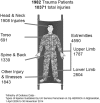Regenerative medicine and war: a front-line focus for UK defence
- PMID: 30155273
- PMCID: PMC6104070
- DOI: 10.1038/s41536-018-0053-4
Regenerative medicine and war: a front-line focus for UK defence
Abstract
The recent prolonged conflicts in Iraq and Afghanistan saw the advancement of deployed trauma care to a point never before seen in war. The rapid translation of lessons from combat casualty care research, facilitated by an appetite for risk, contributed to year-on-year improvements in care of the injured. These paradigms, however, can only ever halt the progression of damage. Regenerative medicine approaches, in contrast, hold a truly disruptive potential to go beyond the cessation of damage from blast or ballistic trauma, to stimulate its reversal, and to do so from a very early point following injury. The internationally distributed and, in parts austere environments in which operational medical care is delivered provide an almost unique challenge to the development and translation of regenerative medicine technologies. In parallel, however, an inherent appetite for risk means that Defence will always be an early adopter. In focusing our operational priorities for regenerative medicine, the authors conducted a review of the current research landscape in the UK and abroad and sought wide clinical opinion. Our priorities are all applicable very far forward in the patient care pathway, and are focused on three broad and currently under-researched areas, namely: (a) blood, as an engineered tissue; (b) the mechanobiology of deep tissue loss and mechanobiological approaches to regeneration, and; (c) modification of the endogenous response. In focusing on these areas, we hope to engender the development of regenerative solutions for improved functional recovery from injuries sustained in conflict.
Conflict of interest statement
All authors are employed by the Armed Forces of the United Kingdom or the Ministry of Defence and declare no competing interests.
Figures



References
-
- Penn-Barwell JG, Roberts SA, Midwinter MJ, Bishop JR. Improved survival in UK combat casualties from Iraq and Afghanistan: 2003−2012. J. Trauma Acute Care Surg. 2015;78:1014–1020. - PubMed
-
- Ministry of Defence. Op Herrick casualty and fatality tables to 28 February 2015. https://www.gov.uk/government/statistics/op-herrick-casualty-and-fatalit... (2016).
-
- DeBruyne, N. F. American War and Military Operations Casualties: Lists and Statistics (Congressional Research Service, Washington, DC, 2017).
Publication types
LinkOut - more resources
Full Text Sources
Other Literature Sources
Research Materials

